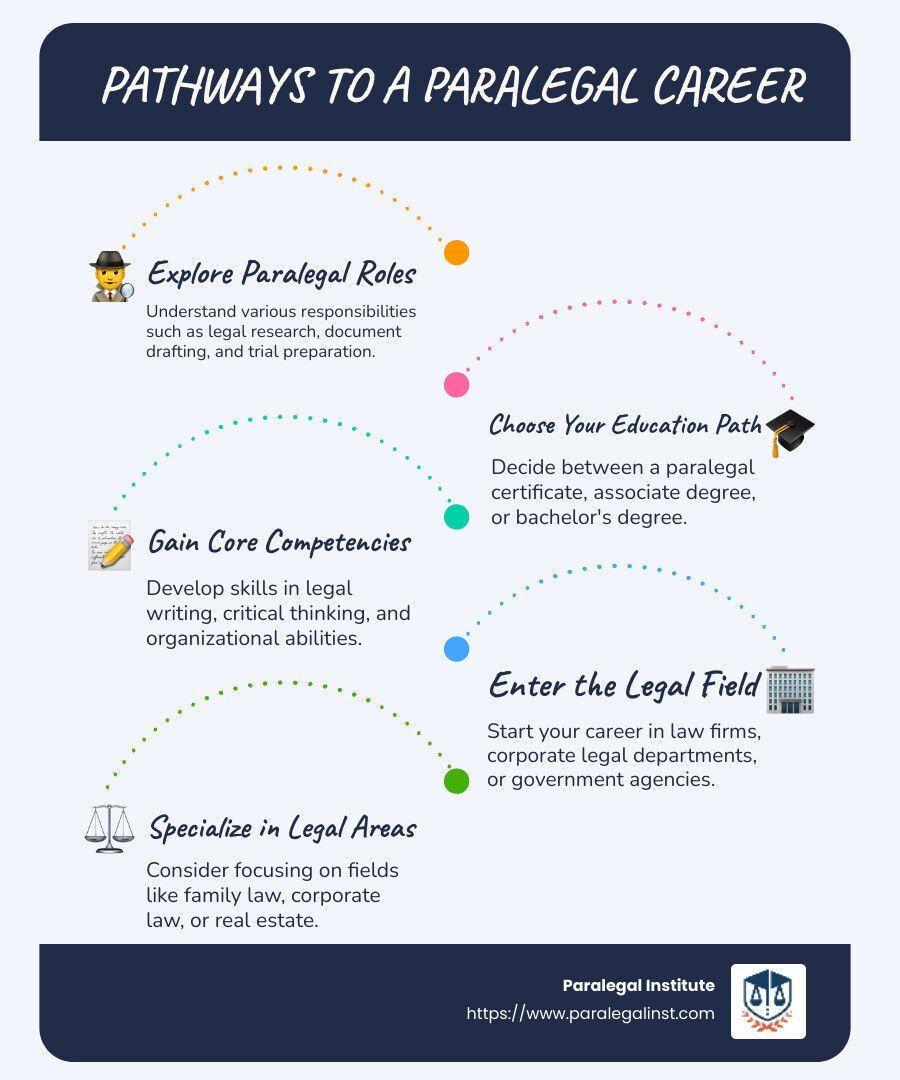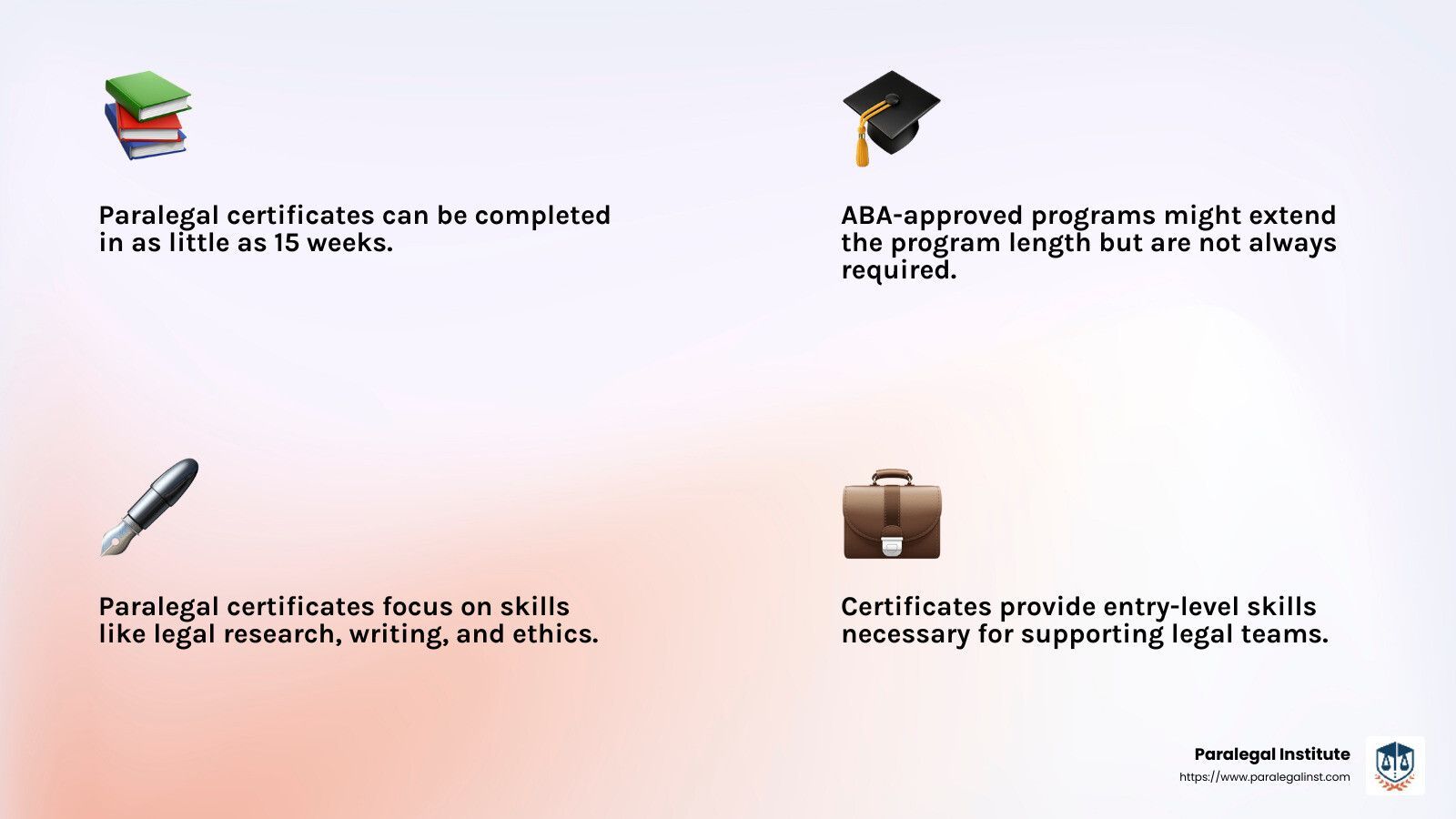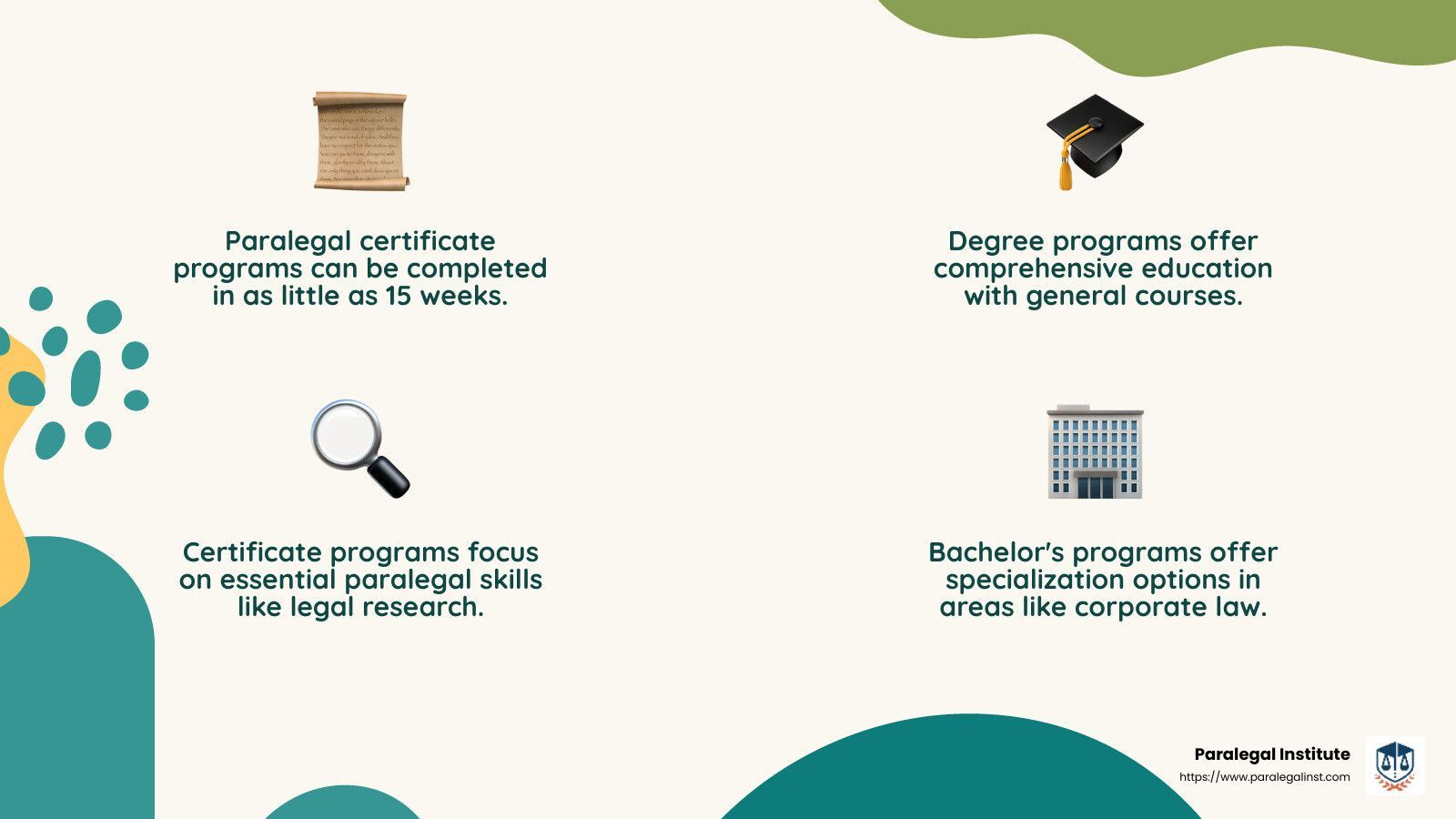The Paralegal Path: How Education Shapes Your Legal Career
Are you considering entering the legal field but overwhelmed by traditional education paths? Career paralegal education offers a streamlined route into this exciting profession, providing essential skills and opening doors to various legal support roles.
- Paralegal Roles: Assist lawyers by conducting research, drafting documents, and preparing for trials.
- Legal Support: Serve as critical members of the legal team, ensuring smooth operations.
- Career Opportunities: Employment growing, with a median salary of $60,970 as of May 2023.
For those aiming for a quick and practical entry into a legal career, earning a paralegal certificate is a smart choice. This education equips you with the knowledge needed to excel in various legal environments, whether in law firms, corporate legal departments, or government agencies.
As Matthew Pfau, the director of the Paralegal Institute, I've developed and refined our curriculum to meet industry needs. My experience hiring and training paralegals fuels my passion for educating future legal professionals. Let's explore how career paralegal education can shape a rewarding legal career.

Understanding Paralegal Education
If you're thinking about a career as a paralegal, understanding the educational landscape is crucial. Let's break down the education requirements and options available for aspiring paralegals.
Education Requirements
To become a paralegal, you need education that provides a solid foundation in legal principles. While you don't need a law degree or to pass the bar exam, having the right education is essential. This typically includes completing a paralegal certificate program, an associate degree, or a bachelor's degree in paralegal studies.
Paralegal Certificate
A paralegal certificate program is a popular choice for many. It's designed for quick completion, often taking as little as 15 weeks. These programs focus on the core skills needed in the legal field, such as legal research, writing, and ethics. The curriculum is streamlined to cover essential topics without unnecessary electives.
- Quick Completion: Most programs can be completed in a few months, making it ideal for those looking to enter the workforce quickly.
- Focused Curriculum: Emphasizes practical skills like document preparation and case management.
- Entry-Level Skills: Provides the foundational knowledge needed for entry-level paralegal positions.
ABA-Approved Programs
While some schools seek approval from the American Bar Association (ABA), it's important to note that not all employers require this. The ABA approval process can extend program length, which may not align with everyone's career goals. Our program, for example, focuses on delivering a comprehensive education in a shorter timeframe, without seeking ABA approval.
Why Choose a Paralegal Certificate?
A paralegal certificate is often preferred by employers seeking candidates with specialized, practical training. It demonstrates that you have the skills and knowledge needed to support legal teams effectively. Plus, it provides a stepping stone for those considering further education or specialization in the legal field.

In summary, understanding your education options is the first step toward a successful paralegal career. Whether you choose a certificate program or pursue further education, the right choice depends on your career goals and personal circumstances.
Next, we'll explore the differences between bachelor's and associate degree programs in paralegal studies and how they fit into your career path.
Career Paralegal Education: Pathways and Options
Choosing the right educational path is key to launching a successful career in the paralegal field. Whether you're looking for a quick entry into the workforce or a more comprehensive educational experience, there are a few paths you can take: paralegal certificate programs, associate degrees, or bachelor's degrees. Each option offers unique benefits and caters to different career goals.
Paralegal Certificate Programs
Paralegal certificate programs are an excellent choice for those seeking a fast track into a paralegal career. These programs are typically shorter in duration, often taking as little as 15 weeks to complete. This makes them an attractive option if you're eager to enter the workforce quickly.
- Quick Completion: Most certificate programs are designed to be completed in under a year, allowing you to start your career sooner.
- Focused Curriculum: These programs zero in on the essential skills needed for paralegal work, such as legal research, document drafting, and case management. You'll gain hands-on experience with legal software like LexisNexis, which is crucial for day-to-day tasks.
- Entry-Level Skills: You'll graduate with the practical skills required to excel in entry-level positions, making you a competitive candidate in the job market.
Bachelor's and Associate Degree Programs
For those seeking a more comprehensive education, pursuing a bachelor's or associate degree in paralegal studies might be the ideal path. These programs offer a broader educational experience, which can be beneficial if you're considering a more specialized career or future advancement in the legal field.
- Comprehensive Education: Unlike certificate programs, degree programs include general education courses, such as English composition and mathematics, providing you with a well-rounded academic foundation.
- Specialization Options: Bachelor's programs often offer the opportunity to specialize in areas like family law, corporate law, or real estate, which can help tailor your education to your career interests.
- General Courses: These programs incorporate a variety of subjects, giving you a wide-ranging education that can be useful in various roles, both within and outside the legal field.
Choosing between a paralegal certificate program and a degree program depends on your career goals, timeline, and educational preferences. A certificate program is ideal for those who want to quickly gain the necessary skills to enter the workforce, while degree programs offer a more in-depth education with opportunities for specialization.

In the next section, we'll explore the essential skills and competencies you need to succeed as a paralegal.
Skills and Competencies for Paralegals
Paralegals are the backbone of legal teams, and their skills are critical to the success of any legal operation. Let's explore the core competencies that every paralegal needs to master.
Core Competencies
Legal Research
Understanding the law is crucial for paralegals. They must be adept at using legal databases like Westlaw and LexisNexis to find relevant statutes, case law, and legal precedents. This skill is essential for building strong legal arguments and supporting attorneys effectively.
Communication Skills
Paralegals often act as a bridge between clients, attorneys, and other legal professionals. Strong communication skills, both written and verbal, are vital. Whether drafting a memo or explaining legal jargon to a client, clarity and precision are key.
Organizational Skills
Juggling multiple cases and deadlines is part of a paralegal's daily routine. Excellent organizational skills ensure that documents are filed correctly, deadlines are met, and nothing slips through the cracks. This competency is what keeps the legal machine running smoothly.
Critical Thinking
Legal problems are rarely straightforward. Paralegals need to analyze complex information, identify potential issues, and develop solutions. Critical thinking allows them to steer the intricacies of legal cases and provide valuable support to attorneys.
Legal Writing
Drafting legal documents is a core part of a paralegal's job. They must be able to write clearly and succinctly, adhering to legal standards and formats. This includes everything from briefs to contracts, so precision in legal writing is non-negotiable.
Computer Skills
Paralegals must be tech-savvy. Proficiency in legal software, word processing, and spreadsheet tools is essential. These skills help paralegals manage case files, conduct research, and communicate efficiently.
Mastering these core competencies not only makes you a valuable asset to any legal team but also sets the stage for a successful and fulfilling career as a paralegal.
In the next section, we'll look at the different roles paralegals play in the legal industry and how they contribute to various legal processes.
The Role of Paralegals in the Legal Industry
Paralegals are the unsung heroes in the legal world. They handle a multitude of tasks that keep the legal system running smoothly. Let's explore the key roles and specializations that paralegals can pursue.
Specializations in Paralegal Work
Paralegals can specialize in various areas of law, allowing them to focus on what interests them most. Here are some common specializations:
Family Law
In family law, paralegals assist with cases involving divorce, child custody, and adoption. They prepare legal documents such as petitions and agreements, and often conduct interviews with clients to gather necessary information. Compassion and attention to detail are crucial in this field, as cases can be emotionally charged.
Corporate Law
Corporate law paralegals work with businesses on issues like mergers, acquisitions, and compliance. They help draft contracts, perform due diligence, and ensure that companies adhere to legal regulations. This specialization requires a strong understanding of business operations and excellent organizational skills.
Real Estate
Real estate paralegals assist with property transactions, including sales, leases, and zoning issues. They prepare documents like deeds and closing statements, and often coordinate with buyers, sellers, and real estate agents. Knowledge of property laws and keen attention to detail are essential in this role.
Job Duties
Paralegals perform a wide range of duties that are vital to the legal process. These include:
- Legal Research: Using databases like Westlaw and LexisNexis, paralegals find legal precedents and statutes that support their cases.
- Document Preparation: Drafting and organizing legal documents such as briefs, contracts, and affidavits is a core responsibility.
- Client Communication: Paralegals often act as the first point of contact for clients, explaining legal procedures and gathering information.
- Case Management: Keeping track of deadlines, court dates, and case files ensures that nothing falls through the cracks.
Paralegals are indispensable to legal teams, offering specialized knowledge and skills that improve the efficiency and effectiveness of legal services. As the demand for legal services grows, so does the need for skilled paralegals in various fields.
In the next section, we'll dive into frequently asked questions about career paralegal education, addressing the pathways and opportunities available.
Frequently Asked Questions about Career Paralegal Education
What kind of education do you need to be a paralegal?
To become a paralegal, you have several education pathways. The most direct route is earning a Paralegal Certificate. This option is quick and focuses on the essential skills needed for entry-level positions. Typically, these programs last around 15 weeks and cover key areas like legal research and writing.
Another option is pursuing an associate or bachelor's degree in paralegal studies. These degree programs provide a more comprehensive education, including general courses and options for specialization. They take longer to complete—usually two years for an associate degree and four years for a bachelor's degree—but offer a broader understanding of the legal field.
How long does it take to become a paralegal?
The time it takes to become a paralegal depends on the education path you choose. A Paralegal Certificate program can be completed in as little as 15 weeks, making it the fastest route. An associate degree typically takes two years, while a bachelor's degree usually requires four years of study.
Each path offers different benefits. A certificate program is ideal for those looking to enter the workforce quickly, while degree programs provide a deeper dive into legal studies and may open up more advanced career opportunities.
Is it worth going to school to be a paralegal?
Absolutely! Investing in paralegal education can lead to rewarding career benefits and job opportunities. Paralegals are in demand across various industries, including law firms, corporate legal departments, and government agencies. With a paralegal education, you gain valuable skills like legal research, critical thinking, and communication, all of which are highly sought after by employers.
A paralegal career offers stability and room for growth. According to the U.S. Bureau of Labor Statistics, the median pay for paralegals was $29.31 per hour in 2023, reflecting the value of their contributions to the legal sector. Plus, with further education and experience, paralegals can advance to more specialized roles or even pursue law school.
In the next section, we'll explore the skills and competencies that are crucial for paralegals to succeed in their roles.
Conclusion
Choosing the right educational path can set the stage for a successful paralegal career, and the Paralegal Institute is here to guide you. Our accelerated curriculum, designed by practicing legal professionals, ensures that you gain the practical skills needed to thrive in the legal industry.
One of the standout features of our program is its focus on hands-on learning. Over a span of just 15 weeks, you'll dive into the core areas of paralegal work, from legal research to document preparation. This approach equips you with the entry-level skills necessary to step confidently into the workforce.
But it’s not just about speed. Our curriculum is crafted to ensure you understand the nuances of the legal system and can apply this knowledge in real-world scenarios. This practical focus is what sets us apart and prepares our students for the diverse challenges they will face in their careers.
The demand for paralegals continues to grow, with opportunities across various sectors like family law, corporate law, and real estate. By choosing the Paralegal Institute, you’re not just earning a certificate; you’re investing in a future filled with potential and promise.
Whether you're just starting out or looking to pivot into a legal career, our program offers the tools and resources you need to succeed. Join us and take the first step on your path to becoming a skilled and valued paralegal.
More from The Paralegal Hub
Ready for a Career Change?
Paralegal Institute. All Rights Reserved.










